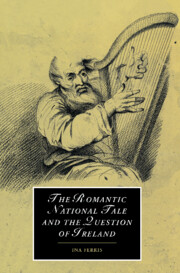Book contents
- Frontmatter
- Contents
- Acknowledgments
- Introduction: the awkward space of Union
- 1 Civic travels: the Irish tour and the new United Kingdom
- 2 Public address: the national tale and the pragmatics of sympathy
- 3 Female agents: rewriting the national heroine in Morgan's later fiction
- 4 The shudder of history: Irish Gothic and ruin writing
- 5 Agitated bodies: the Emancipation debate and novels of insurgency in the 1820s
- Notes
- Bibliography
- Index
- CAMBRIDGE STUDIES IN ROMANTICISM
5 - Agitated bodies: the Emancipation debate and novels of insurgency in the 1820s
Published online by Cambridge University Press: 22 September 2009
- Frontmatter
- Contents
- Acknowledgments
- Introduction: the awkward space of Union
- 1 Civic travels: the Irish tour and the new United Kingdom
- 2 Public address: the national tale and the pragmatics of sympathy
- 3 Female agents: rewriting the national heroine in Morgan's later fiction
- 4 The shudder of history: Irish Gothic and ruin writing
- 5 Agitated bodies: the Emancipation debate and novels of insurgency in the 1820s
- Notes
- Bibliography
- Index
- CAMBRIDGE STUDIES IN ROMANTICISM
Summary
It is difficult to judge of the numbers of the rebels, they appear in such crowds and so little order.
Brigadier-General John Moore, Wexford, 23 June 1798“And when will they grow quiet, Sir?”
“When, indeed, General.”
John Banim The Anglo-Irish of the Nineteenth Century (1828)Responding to stepped-up Irish political agitation in 1824, an exasperated reviewer in the Literary Chronicle complained that Irish Catholics, led by “that hot-headed lawyer, Daniel O'Connell,” were “perpetually clamouring.” The specific object of the clamor was Catholic Emancipation, but the reviewer is in no doubt that were emancipation to be gained, the Irish would “next day clamour for a separation from England.” Clamor thus marks the endemic mode of Irish political being, an old charge but one that took on a distinctive edge in the 1820s. In this decade Ireland once again became a prominent site of turbulence and anxiety in British discourse, as it suffered severe economic distress and famine; witnessed renewed agrarian militancy under the name of Captain Rock, along with increased sectarian violence; and – most immediately to the point for civic discourse – saw the innovative and formidable campaign for full civil rights spearheaded by O'Connell and the Catholic Association. The Association's barrage of petitions, speeches, pamphlets, motions, and meetings combined with its extraordinary organization of the Catholic masses in the Irish countryside to produce a new Irish politics.
- Type
- Chapter
- Information
- The Romantic National Tale and the Question of Ireland , pp. 127 - 154Publisher: Cambridge University PressPrint publication year: 2002



